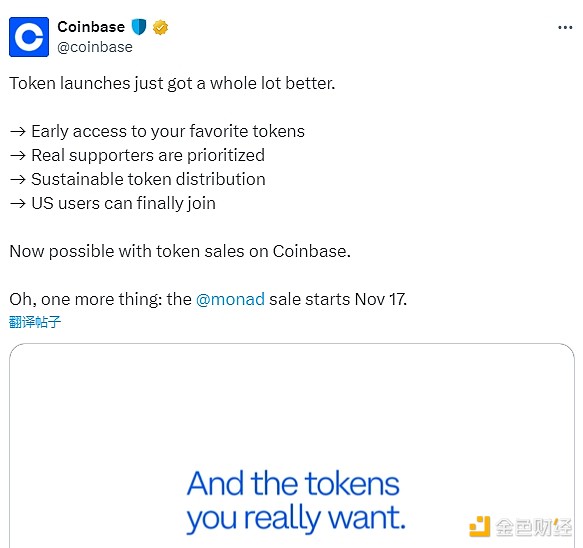Users can submit token requests at any time during the window period. After the window closes, our algorithm will determine the final token allocation. User-centric: Coinbase's sales plan prioritizes allocations to genuine supporters. Users who sell tokens shortly after listing (within 30 days) may receive a smaller allocation in subsequent sales. This is designed to prioritize the participation of genuine users of the project. Coinbase believes that new standards for token sales require all parties to maintain a clear stance. Industry-leading disclosure: Coinbase requires issuers to provide users with key information disclosures. This ensures that investors fully understand the project, the token's economic model, and the team behind the token before making a purchase decision. Issuer lock-up and price discovery: Issuers and their affiliates are prohibited from selling any tokens on the over-the-counter (OTC) or secondary markets for six months following the Coinbase public sale. All sales must be approved and publicly disclosed by Coinbase and must have a lock-up period; tokens will only be unlocked after six months. There are no fees for participating in or listing tokens: Users do not need to pay any fees to participate in token sales. Coinbase will charge issuers a percentage of the sale price in USDC. This commission applies only to the token sale itself; Coinbase does not charge listing fees. Coinbase will hold a token sale monthly to ensure each sale receives full support and attention from the Coinbase platform and community, while maintaining the highest standards. In the coming months, Coinbase plans to add more features to the token sale platform, including limit orders and increased allocations for issuers' target user groups. Assets launched in Coinbase token sales will be added to the Coinbase listing roadmap.
II. Coinbase's ICO Debut – Monad
Coinbase announced on X that it will conduct the initial token offering (ICO) of Monad on November 17th.

Users must purchase tokens using the Circle (CRCL) stablecoin USDC, and only reputable users who have completed identity verification and compliance checks can participate.
Monad is a high-performance and low-latency Layer-1 blockchain that is fully compatible with the Ethereum Virtual Machine (EVM).
With its innovative MonadBFT consensus mechanism, parallel execution, and advanced network protocol, the network promises final confirmation in less than a second and offers superior scalability compared to Ethereum. Co-founders Keone Hon, James Hunsaker, and Eunice Giarta lead the project through two entities: the Monad Foundation and Category Labs, which raised a total of $262 million in three funding rounds between 2022 and 2024. The total issuance of Monad's assets in this offering is 100 billion MON tokens. 7.5% will be sold through the Coinbase platform at a price of $0.025 per MON. ICO participants can bid from $100 to $100,000. The remaining portion of the total MON supply will be allocated as follows: 38.5% – Reserved for ecosystem development; 27% – Allocated to the team; 19.7% – Proceeds for project investors; 4% – For Category Labs (formerly Monad Labs). The tokens allocated in the last three distributions will remain locked for a lock-up period. These assets will be unlocked gradually according to a predetermined schedule. The Monad mainnet launch date is November 24th. III. The Return of the ICO Era? The End of the Airdrop Era? Coinbase's move is significant. First, Coinbase is providing projects with a completely new way to raise funds: raising capital from verified participants, instantly launching and gaining liquidity, avoiding the chaos of airdrops. This means the era of airdrops may be coming to an end. In the regulatory vacuum following ICOs, airdrops were once the preferred method for "community building." But clearly, airdrops have also been abused and become a tool for profiteering. Second, Coinbase also reaffirms the increasingly blurred lines between cryptocurrencies and traditional finance. In this new model, ICOs are more like initial public offerings (IPOs), and Coinbase plays a "gatekeeper" role, deciding which projects will be approved. Finally, Coinbase has brought a turning point to the industry. If the previous cycle was about "cryptocurrencies fighting regulators," then this cycle is more like "cryptocurrency builders developing compliantly within a regulatory framework." Coinbase has picked up on the legacy issues of ICOs, giving them renewed vitality in the open. The launch of Coinbase's ICO platform will lead to more initial coin offerings (ICOs) choosing Coinbase over venture capital platforms; airdrops are shifting from a core strategy to a supporting role; and US retail investors are once again able to participate in ICOs. Eight years later, the frenzied hype of the last ICO boom is still fresh in everyone's mind. However, Coinbase's move has not brought back the ICO era, but rather created new development opportunities within a compliant framework, which will ultimately drive the crypto market towards a more stable direction.
 Anais
Anais





